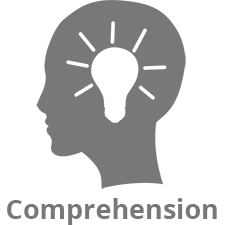Do you have high reading comprehension? This question isn’t as easy to answer as you might think. Let’s say a friend gives you a political op-ed from the newspaper, and you understand every word of it. Then the friend hands you a pharmaceutical study published in the New England Journal of Medicine, and you hardly comprehend any of it. The discrepancy has to do with your background knowledge. If you’ve never studied or taken an interest in biology and medicine, you’re less likely to understand the NEJM article. But when the political op-ed relates to topics you’ve studied or discussed before, your comprehension is excellent. So… do you have high reading comprehension, or not?
One person’s comprehension skills can vary widely from topic to topic, which is why comprehension can be so difficult to teach. A sports-enthusiast in your classroom might easily comprehend a story about basketball but have a more difficult time with his social studies textbook. How can you help this student? As you know, the solution is not to give him sports-related reading material only. He needs more exposure to social studies topics and more opportunities to practice reading about them. Teachers have an obligation to help their students develop strong comprehension skills across a variety of subjects, so that, more often than not, the texts students encounter in academics and beyond will be understandable.
A recent New York Times article, “How to Get Your Mind to Read” by Psychology Professor Daniel T. Willingham, offers valuable insights on how to do this. The author asserts that acquiring factual knowledge is the key to developing high comprehension skills. Studies have shown that students who score high on general knowledge tests (e.g., a high-school student who can answer questions such as “Which part of the body is affected by pneumonia?” and “Which U.S. President resigned because of the Watergate scandal?”) also score higher on standardized tests in reading. This is because reading comprehension and factual knowledge are inextricably linked. Therefore, Willingham asserts that the way to improve reading scores is not necessarily to provide more literacy instruction. Rather, educators should focus on providing students with more high-information texts. “The systematic building of knowledge must be a priority in curriculum design,” he says.
Vocabulary also plays a key role in comprehension, and high-information texts are likely to include the rich vocabulary that students will encounter as their reading material becomes more sophisticated.
At Read Naturally, we’ve incorporated these ideas into our curricula since the beginning. We’ve always insisted on high-interest, nonfiction reading passages in all of our programs. In many ways, it would have been easier for us to provide fictional content that did not incorporate many facts. This kind of content is easier to tailor to readability and requires far less time to research, write, and fact check. But providing “fact-light” fictional content would mean missing an opportunity to help students develop the knowledge that is so crucial to comprehension. Because comprehension is the ultimate goal, high-interest, nonfiction content has always been nonnegotiable.
We have a rule that all of our stories—even those at the lowest levels—should contain interesting factual information that even adults might not know. We also insist on incorporating and teaching useful vocabulary words that students are likely to encounter in future texts. Furthermore, we make sure each Read Naturally level contains a variety of relevant topics. For example, in just one level of Read Naturally, a reader can expect to find stories about science, history, pop culture, the arts, athletics, and more. This wide exposure increases a student’s background knowledge, which aids the comprehension of future reading material in many subjects.
Students working through our programs are held accountable for comprehension every step of the way. Our programs require that they correctly answer quiz questions and write a thoughtful retelling of the story before they can move on.
For these reasons, you can feel confident that a student using Read Naturally materials is developing literacy skills and building a large base of factual knowledge. When it comes to improving reading comprehension, this combination is the best recipe there is.
 Share your student’s success story—nominate him or her for our Star of the Month award. Win a Barnes & Noble gift card for the student and a Read Naturally gift certificate for your class!
Share your student’s success story—nominate him or her for our Star of the Month award. Win a Barnes & Noble gift card for the student and a Read Naturally gift certificate for your class!
Post a New Comment